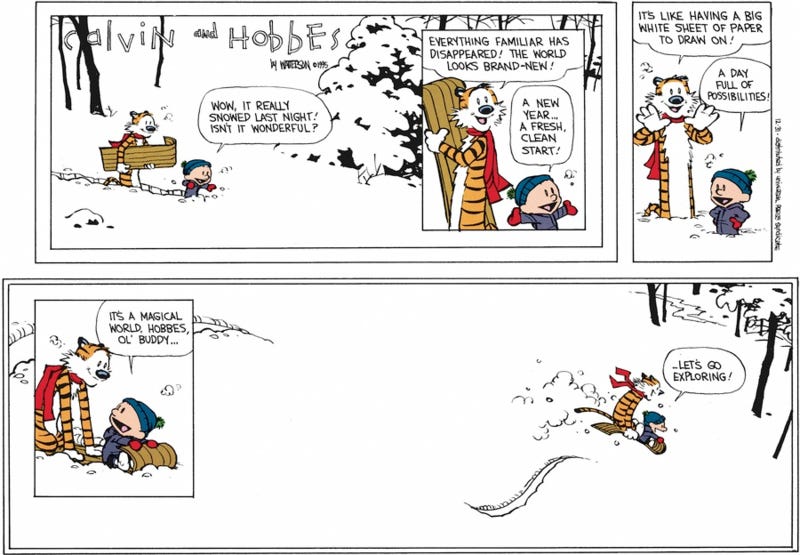Can I confess something to you?
[looks around conspiratorially]
[leans in]
[whispers]
I love New Year’s resolutions.
I make them every year. I believe in them wholeheartedly, despite a lifetime success rate roughly in line with the Cleveland Browns’ 21st-century winning percentage. Do I recognize this futility each year? Yes. Do I still make private promises to myself on the first day of each year that this year, this year is going to be different, though? Absolutely, and without fail. Roughly two-thirds of the time, I’m promising myself that I’ll get in better shape. Sometimes that sticks, and that’s followed up by the years that I resolve to stay in shape. Those usually don’t stick, and so the cycle repeats. Sunrise, sunset, MyFitnessPal tracking for the first seventeen days of January and then six non-consecutive days spread over the next five months.
There’s the other goals, too. Reading more, writing more, tweeting less, exercising more financial prudence, finally driving the Canada geese out of the waterfront park and becoming the Saint Patrick of my lunchtime walk route — there’s always something that I want to improve about myself. Fresh out of the sleepily hedonistic purgatory between Christmas and New Year’s, a time where I live in a hoodie and Zubaz, don’t shave for a week, and subside entirely on cheese cubes, cookies and wine, January 1st feels like a great time to pick something, anything, to improve about myself.
I even map it out. Maybe I’ll train for another race this year. I’ve done it before, often fueled by a burst of new-year optimism, and I can do it again. I’ll stare at a fresh, clean page of notebook paper and map out a training plan in week-by-week detail, figuring out exactly how I’m going to maximize the use of all 52 weeks in the coming year. Ooh, 2020 is a leap year! That’s an extra day! That means I can be 0.27% better than in a normal year! I have notebooks filled with these sort of optimistic plans, things that I grumble quietly about and quickly flip past when I uncover them much later on, cleaning out a desk drawer or work bag. At the beginning of the year, though? The plans are perfect.
12 months to change myself. 12 months to become everything I’ve planned on becoming.
[a month passes] 11 months is plenty of time, you know.
[two more months pass] I’ll start once the weather warms up.
[another month passes] I mean after Memorial Day.
[at a Fourth of July barbecue] Training is overrated, really. I once did a triathlon without training, and I didn’t drown. Did need to hold onto a buoy for a minute. Anyways, hold my beer, I’m gonna get another burger.
[mid-September] I can roll the race registration over to next year.
[late November] I’ll make a change after the new year. Next year’s really when I’m gonna put it together.
Last month, I wrote about recognizing my problem with setting arbitrary landmarks, and I stand by what I said there. Getting past a milestone doesn’t change who you are. You’ll be the same person after that you were before, and accepting that is a big part of appreciating who you are, and moving toward the future happily. There’s something special about turning over a new year that I believe in, though, and it’s in finding the line between what we lose and what we leave behind.
In the course of a year, we lose a lot. Small things. Wallets, car keys, phones. Big things like jobs, pets, relationships, loved ones. Much of it we have no control over, and we will have no control over what we lose in the next year. Every year will bring a measure of heartache, tragedy and loss that’s well outside of the purview of a simple first-of-the-year proclamation to change.
What we do have control over, though, is what we’re able to leave behind. The real promise of a new year is in declaring done what’s done. The missteps, mis-speakings, and mistakes of the past year belong to that year, and we can leave them there. Whatever I screwed up, I didn’t do it in 2020. It’s an arbitrary thing, but at the bleakest time of the year, while we’re still waiting in vain for the sunlight to come back, we can be forgiven for filling ourselves with delusion, optimism, and the blind hope that everything will be different this year.
Did I make mistakes in 2019? Of course. Some of them are understandable and forgivable. Others, less so. Some are available in the archives of this newsletter. All of them belong to the year that just ended, and I plan to keep them that way.
I’ve had a copy of this cartoon hanging on my (many) walls for nearly a quarter-century, yellowing newsprint from when I originally clipped it from the pages of the Cleveland Plain Dealer.

I’m not the thirteen-year-old kid I was then, but in my core I haven’t changed. I believe in the new year. I believe in change. I believe in leaving behind all the bad things we are able to from the past year.
I believe in a big white sheet of paper to draw on.
Happy New Year. I hope you have a wonderful 2020.
— Scott Hines (@actioncookbook)


